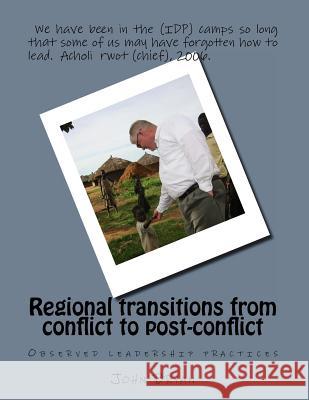Regional transitions from conflict to post-conflict: Observed leadership practices » książka
Regional transitions from conflict to post-conflict: Observed leadership practices
ISBN-13: 9781494986841 / Angielski / Miękka / 2014 / 338 str.
The problem faced by Acholi leaders of Northern Uganda, during a time of transition from the end of a 20+ year conflict to post-conflict and sustainable peace, is that no clear model of leadership exists for this transition. The intent of this qualitative research study using a Delphi research design was to discover a leadership model that would serve as a roadmap to guide the transition. Fourteen themes emerged: (a) cultural change, (b) reconciliation, (c) revenge and restitution, (d) traditional leader roles, (e) leader practices and behaviors, (f) repatriation, (g) recovery, (h) relationships, (i) situations, (j) value-based decisions, (k) collaboration, (l) leader roles, (m) sustainability, and (n) consensus. A leadership model emerged from consensus on culturally appropriate leadership practices. This volume is, in effect, a 2nd edition of a doctoral dissertation published in 2009 in partial fulfillment of a Doctorate in Business Administration from the School of Advanced Studies at the University of Phoenix. Changes from the original are primarily in format, most noticeably from double-spaced to single-spaced content, and in the elimination of 336 figures in favor of more concise formats for presenting statistics. This new edition is the first volume of a planned four-volume set on leadership based on a comprehensive study of the perceptions of leaders in Uganda on the appropriate roles, practices, and behaviors of leaders. The initial 47 participating leaders were from the Acholi Subregion of Uganda, primary site of a 22-year uncivil civil war waged against the Government of Uganda and the Acholi people by the Lord's Resistance Army. Within 12 months of collecting the initial data, 275 additional leaders in the Acholi Subregion provided responses to the original 46-item questionnaire to fill some perceived gaps in the original study and to begin to clarify some apparent distinctions emerging from the original data on demographic grounds.. The additional Acholi data and data from the remainder of Uganda is the topic of volumes two and three of the set. The fourth volume will be a begin to lay out a curriculum for leaders following conflict based on what appears to be the largest set of empirical data collected from leaders on the continent of Africa.
Zawartość książki może nie spełniać oczekiwań – reklamacje nie obejmują treści, która mogła nie być redakcyjnie ani merytorycznie opracowana.











